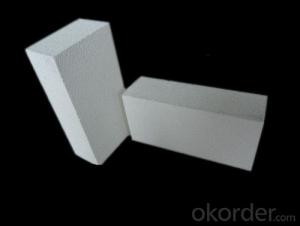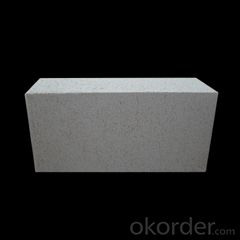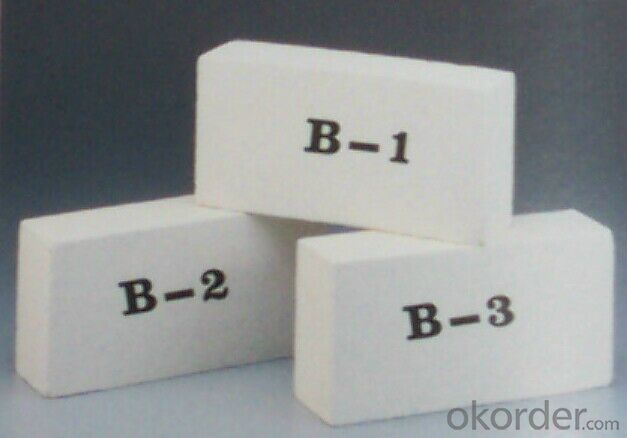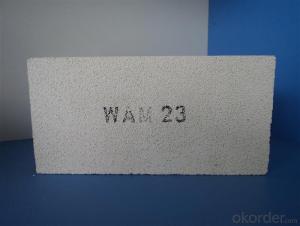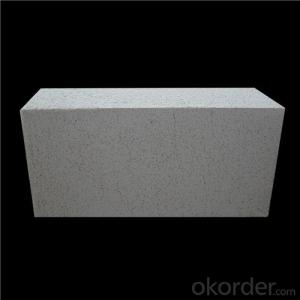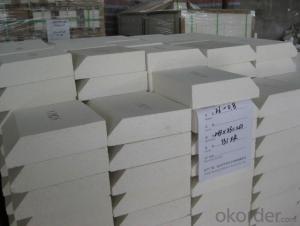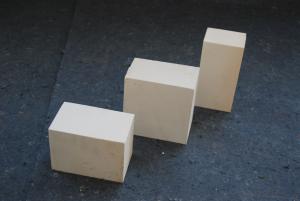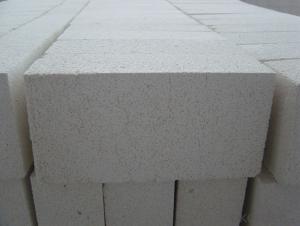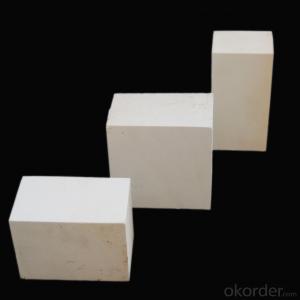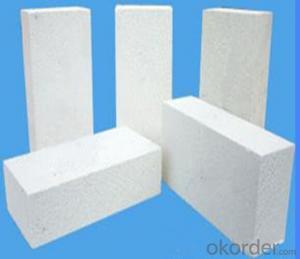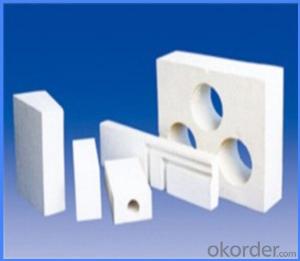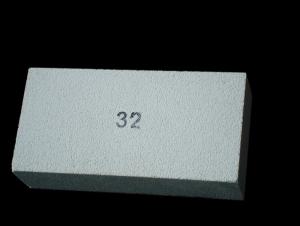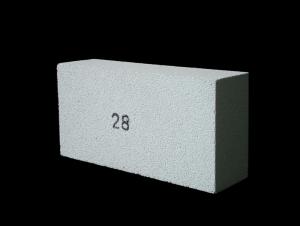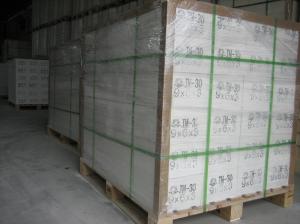Insulating Fire Brick - Refractory JM Mullite Insulation Brick B-1
- Loading Port:
- Shanghai
- Payment Terms:
- TT OR LC
- Min Order Qty:
- 10 m.t.
- Supply Capability:
- 1000 m.t./month
OKorder Service Pledge
OKorder Financial Service
You Might Also Like
Specifications
1. Low density.
2. Classification temperature:1610-1780.
3. Thermal insulation energy-saving effect is good.
High alumina insulation brick,Insulation brick,Fireclay insulation brick
Features:
1. Low thermal conductivity.
2. High strength and resistance to corrosion.
3. Low heat capacity.
4. Low shrinkage after heavy firing.
5. High insulation.
6. High refractoriness.
7. Low density.
8. Good thermal shock resistance under high temperature.
9. Thermal insulation energy-saving effect is good.
Physical and chemical index:
Application:
Insulation brick can be widely used for lining or insulation layers of various industrial furnaces and kilns in metallurgical industry, machine building industry, ceramic industry, chemical industry.
Refractory mullite insulating refractory brick JM 23
Okorder series heat insulation brick
Okorder series thermal insulation brick is an effective, energy saving, low carbon, environmental protection advanced, according to the ASTM standard manufacturing products. Okorder series products are best Li Ning and insulation in all types of industrial furnaces in the metallurgical field, aluminum, petrochemical, electric power and glass ceramic materials. They can be used as part of the working layer of thermal insulation or non - melting. Products have been widely used in the following furnace, achieved satisfactory results.
Application of heat preservation brick
Metallurgical Industry: blast furnace, hot blast furnace, heating furnace, etc..
Petrochemical Industry: ethylene cracking furnace, hydrogen production furnace, primary reformer, heating furnace, etc..
Ceramic industry: roller kiln, kiln, etc..
Glass industry: glass furnace regenerator, etc.
Carbon industry: carbon furnace, etc..
Aluminum electrolysis industry: aluminum reduction cell, etc.
Other industries: tunnel kiln, shuttle kiln, etc..
Advantages of heat insulation brick
Low thermal conductivity: more porosity will bring good thermal insulation effect, energy saving.
High crushing strength: high crushing strength, volume stability.
Low heat storage: small heat storage to absorb more heat, energy-saving effect is obvious.
Gao Chundu: iron, alkali metal impurity content is low.
The precise size: Brick size processing precision, special shape cutting and grinding, accelerate the brickwork.
Insulating brick picture
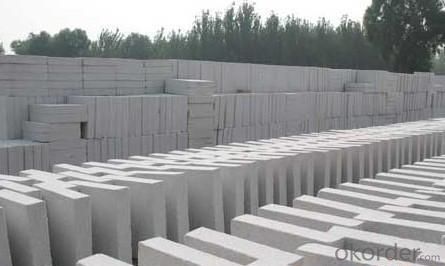
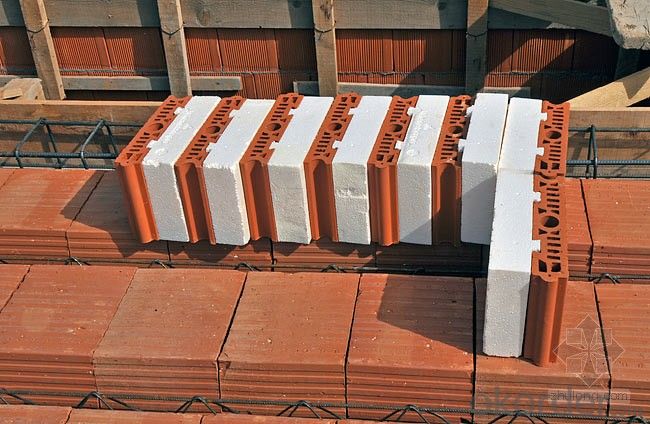
Common problem solutions
1. What products do you have?
We have all kinds of refractory bricks, refractory casting materials, mortar, cement, ceramic fiber products, etc..
Or you can browse our products to choose what you need.
2. How to control product quality?
With strict quality control system throughout the material selection and production process, we have the quality of refractory materials and ceramic fiber products to meet customer requirements.
From the selection of raw materials, the quality of our control to start. The quality certificate of the raw material is required, each batch of the products are to be tested in the use of the forward line. In the production process, the quality control by the workers, and then each piece of classification, and through the quality supervision and inspection.
3. Can you give me a brief introduction to the application of your product?
My company is mainly engaged in refractories in the steel, cement, glass, ceramics, petrochemical, electric power and other industries.
4. What information do you need if I need you?
In order to select the right products, we will provide us with information, such as the United States, technical data, order quantity, product application, etc..
If you have any questions, please contact us.
- Q: Are insulating fire bricks resistant to flame impingement?
- Yes, insulating fire bricks are resistant to flame impingement.
- Q: Are insulating fire bricks resistant to pests or rodents?
- Insulating fire bricks are not specifically designed or treated to be resistant to pests or rodents. While the dense nature of these bricks may make it more difficult for pests or rodents to chew through them compared to other materials, they are not completely immune to infestations. If you are concerned about pests or rodents, it is advisable to take additional measures such as sealing any gaps or cracks in the brickwork, ensuring proper ventilation, and implementing pest control methods as needed.
- Q: Are insulating fire bricks suitable for use in glass melting furnaces?
- Insulating fire bricks can be suitable for use in glass melting furnaces, depending on the specific requirements of the furnace and the type of glass being melted. Insulating fire bricks are made from lightweight materials with low thermal conductivity, which makes them effective at retaining heat and reducing energy loss in the furnace. This can help improve the energy efficiency of the furnace and reduce operating costs. However, it is important to consider the temperature and atmosphere inside the glass melting furnace when choosing the type of insulating fire bricks. Glass melting furnaces operate at extremely high temperatures, often exceeding 1500°C (2732°F). Some insulating fire bricks may not be able to withstand such high temperatures and could degrade or even melt under these conditions. Additionally, the atmosphere inside the glass melting furnace can have an impact on the suitability of the insulating fire bricks. Some types of insulating fire bricks may react with certain gases or chemicals present in the furnace atmosphere, leading to degradation or contamination of the glass being melted. Therefore, it is crucial to select insulating fire bricks that are compatible with the specific atmosphere and conditions inside the glass melting furnace. In summary, insulating fire bricks can be suitable for use in glass melting furnaces, but careful consideration must be given to their temperature resistance and compatibility with the furnace atmosphere. Consulting with experts or suppliers who specialize in refractory materials for glass melting furnaces can help ensure the appropriate selection of insulating fire bricks for optimal furnace performance and glass quality.
- Q: Can insulating fire bricks be used in chimneys and flues?
- Insulating fire bricks are designed specifically for high-temperature usage and are commonly employed in industrial settings, furnaces, and kilns. While they possess exceptional insulating properties, they may not be the optimal choice for chimneys and flues in residential or commercial buildings. The primary reason for this is that insulating fire bricks lack the durability and heat resistance found in other materials specifically designed for chimney and flue construction. They have the potential to crack or break when subjected to the extreme heat and rapid temperature fluctuations that occur in chimneys. Moreover, these bricks are not typically engineered to withstand the corrosive effects of flue gases, which can result in their degradation over time. When dealing with chimneys and flues, it is generally recommended to utilize materials like clay flue liners, stainless steel, or refractory bricks that are specifically manufactured for these purposes. These materials are better equipped to handle the elevated temperatures, corrosive gases, and rapid thermal expansion and contraction that are inherent to chimneys. It is crucial to consult a professional chimney or flue specialist who can provide guidance on the suitable materials to employ based on the specific requirements and conditions of your chimney or flue system.
- Q: Are insulating fire bricks suitable for use in boilers?
- Yes, insulating fire bricks are suitable for use in boilers. They have excellent thermal insulation properties, which help to minimize heat loss and increase energy efficiency in boilers. Additionally, their high temperature resistance ensures they can withstand the extreme heat generated within the boiler.
- Q: Can insulating fire bricks be used in brick ovens?
- Yes, insulating fire bricks can be used in brick ovens. Insulating fire bricks are designed to withstand high temperatures and provide excellent heat insulation, making them ideal for use in brick ovens. These bricks are made from lightweight refractory materials, which help to reduce heat loss and improve the overall energy efficiency of the oven. Additionally, insulating fire bricks are resistant to thermal shock, meaning they can withstand rapid changes in temperature without cracking or breaking. This makes them a reliable and durable choice for brick oven construction.
- Q: Can insulating fire bricks be used in the construction of lime production kilns?
- Yes, insulating fire bricks can be used in the construction of lime production kilns. Insulating fire bricks are designed to have excellent thermal insulation properties, which makes them suitable for high-temperature applications like lime production kilns. They can help in maintaining the desired temperature inside the kilns and reducing heat loss, enhancing the efficiency and productivity of the lime production process.
- Q: Do insulating fire bricks have a high resistance to creep?
- Insulating fire bricks possess a notable resistance to creep, indicating their ability to resist deformation over time when subjected to a consistent load or stress. Their design enables them to endure high temperatures and retain their form and integrity despite prolonged exposure to heat. These bricks are composed of lightweight refractory materials like clay, which exhibit low thermal conductivity and exceptional resistance to thermal shock. The amalgamation of these characteristics empowers insulating fire bricks to withstand creep and uphold their structural stability, even in the most challenging and extreme circumstances.
- Q: Can insulating fire bricks be used in the construction of smelting furnaces?
- Yes, insulating fire bricks can be used in the construction of smelting furnaces. These bricks are designed to withstand high temperatures and provide excellent insulation, making them suitable for smelting furnaces where heat retention is crucial. They help to minimize heat loss and maintain the desired temperature within the furnace, thus improving energy efficiency and overall performance.
- Q: Can insulating fire bricks be used as a refractory material?
- Yes, insulating fire bricks can be used as a refractory material. Insulating fire bricks have excellent thermal insulation properties and can withstand high temperatures, making them suitable for use in various refractory applications such as furnaces, kilns, and insulation linings.
Send your message to us
Insulating Fire Brick - Refractory JM Mullite Insulation Brick B-1
- Loading Port:
- Shanghai
- Payment Terms:
- TT OR LC
- Min Order Qty:
- 10 m.t.
- Supply Capability:
- 1000 m.t./month
OKorder Service Pledge
OKorder Financial Service
Similar products
Hot products
Hot Searches
Related keywords
